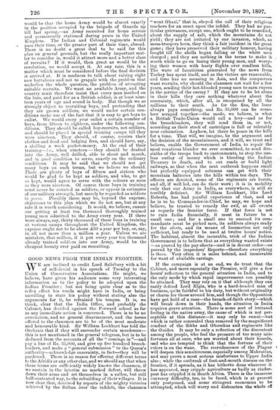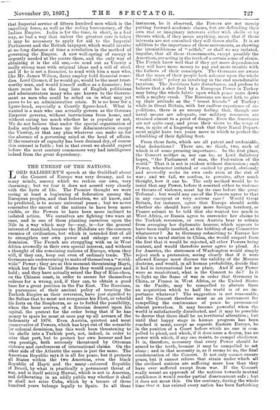GOOD NEWS FROM THE INDIAN FRONTIER.
WE are inclined to credit Lord Salisbury with a bit of self-denial in his speech of Tuesday to the Union of Conservative Associations. He might, we believe, have given his audience some very interesting information as to the policy to be adopted upon the Indian Frontier ; but not being quite clear as to the reflex effect his words might have in India, or being unwilling to state his policy without stating also the arguments for it, he refrained his tongue. It is, we think, clear that the India Office, and probably the Cabinet, has decided against the Forward school as far as any immediate action is concerned. There is to be no annexation, and no general disarmament, and the terms offered to the clansmen are to be of the most moderate and honourable kind. Sir William Lockhart has told the Orokzais that if they will surrender certain murderers— this is not mentioned in the general telegram, but is to be deduced from the accounts of all the " comings in "—and pay a fine of Rs. 35,000, and give up five hundred breech- loaders, and make a " general submission" to the Queen's authority—acknowledge suzerainty, in fact—they will be pardoned. There is no reason for offering different terms to the Afridis or any other clan, and we should say that when these terms are sufficiently widely known the clansmen, if we sustain in the interim no marked defeat, will throw down their arms and set themselves in a sullen, but still half-contented way, to the rebuilding of their villages. It is now clear that, deceived by reports of the mighty victories achieved by the Sultan over the infidels, the clansmen " went Ghazi," that is, obeyed the call of their religious teachers for an onset upon the infidel. They had no par- ticular grievances, except one, which ought to be remedied, about the supply of salt, which the mountains do not yield; they are not irritated by our invasion, which, as moss-troopers born, they think a fair incident in the great game ; they have preserved their military honour, having fought till the shells began falling or the white men charged ; and they see nothing in the terms to make it , worth while to go on losing their young men, and worry. ing their women with hasty flights over roadless hills. The wave of fanaticism generated by the news from Turkey has spent itself, and as the victors are reasonable, and time has no meaning in Asia, and the conquerors want recruits, why should the clansmen not wait for a few years, sending their hot-blooded young men to earn rupees in the service of the enemy ? If they are to be let alone in their hills they care nothing whatever about the suzerainty, which, after all, is recognised by all the millions to their south. As for the fine, the loser always pays something, and Rs. 35,000 can be some- how scraped together—the mode, we believe, is what a British Trade-Union would call a levy—and as for the breechloaders, they will send them in, or not, according as their stock of cartridges is full or tolerably near exhaustion. Anyhow, let there be peace in the hills for a time. That will, we imagine, be the argument and the decision of the mountaineers, and it will, we trust and believe, enable the Government of India to repair the most vexatious blunder we ever committed, to send five- sixths of the troops back to cantonments, to stop the use- less outlay of money which is bleeding the Indian Treasury to death, and to cut roads or build light railways, so that when the next outbreak happens small but perfectly equipped columns can get with their mountain batteries into the hills within ten days. The officers are devoted, some of the regiments are heroic, and all, if well led, can do their work ; it is in mobility only that our Army in India, as everywhere, is still so terribly deficient. Sir William Lockhart, like Lord Roberts, has had painful experience of that, and as he is to be Commander-in-Chief, he may, we hope and believe, be trusted to remedy the evil, at all events as regards the frontier force. If that force is not to ruin India financially, it must in future be a small one ; and for a small one to succeed its com- mandants must be picked men, its soldiers always ready for the alerte, and its means of locomotion not only sufficient, but ready to be used at twelve hours' notice. The habitual, almost the incurable, trick of the Indian Government is to believe that as everything wanted exists —as proved by the pay-sheets--and is in decent order—as proved by the inspectors' Reports—therefore everything is there. Very often it is miles behind, and immovable for want of available carriage.
If the campaign is at an end, we do trust that the Cabinet, and more especially the Premier, will give a few hours' reflection to the general situation in India, and to the only mode by which rapid improvement can possibly be attained. They may rely on it that although they can easily defend Lord Elgin, who is a hard-headed man of business, quite faithful to his duty, but without originality or charm for those around him, and though the Opposition have got hold of a case—the breach-of-faith story—which will break down in their hands, the situation in India requires grave attention. There is some sort of irritated feeling in the native army, the cause of which is not per- ceptible at this distance—it may only be ennui—but which is rather concealed than removed by the magnificent conduct of the Sikhs and Ghoonkas and regiments like the Guides. It may be only a reflection of the discontent among the people, who feel the pressure of too many mis- fortunes all at once, who are worried about their hoards, and who are tempted to think that the fortune of their rulers is on the wane. The recrudescence of the Plague will deepen this sensitiveness, especially among Mahrattas, and may prove a most serious misfortune to Upper India also ; while the outbreak of foot-and-mouth disease on the frontier, if it spreads, as it has hitherto done wherever it has appeared, may cripple agriculture as badly as rinder. pest has crippled it in South Africa. There is the immense currency difficulty, too, to be faced, which is at present only postponed, and some stringent economies to be attempted, which will worry and dishearten the whole of that Imperial service of fifteen hundred men which is the impelling force, as well as the ruling bureaucracy, of the Indian Empire. India is for the time, in short, in a bad way, so bad a way that unless the greatest care is taken it may be necessary to apply for aid to the Imperial Parliament and the British taxpayer, which would involve at no long distance of time a revolution in the method of governing the Empire. A new well-spring of energy is urgently needed at the centre there, and the only way of obtaining it is the old one,—to send out as Viceroy a really strong man with original ideas and a will of steel, and if he is not a financier, to send with him a man who, like Mr. James Wilson, dares employ bold financial reme- dies. Lord Cromer, if be would go, would be the most trust- worthy man, and would himself suffice as a financier ; but there must be in the long lists of English politicians and administrators many who are known to the Govern- ment as men who could be relied on in what may yet prove to be an administrative crisis. It is no hour for a figure-head, especially a Courtly figure-head. What is wanted is a man who can actually govern as the German Emperor governs, without instructions from home, and without caring too much whether he is popular or not. We do not believe that under the special organisation of India anybody can brace up the Administration except the Viceroy, or that any plan whatever can make up for the absence of a governing mind at the head of affairs. If the reservoir of capacity has been drained dry, of course this counsel is futile ; but in that event we should expect before the next century commences very bad intelligence indeed from the great dependency.























































 Previous page
Previous page